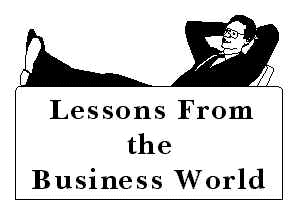F.U.N. News Issue #6

Competition
By Billy Greer
It's a dog eat dog world out there and the business that isn't competitive
won't survive for long. What's one of the best weapons available for this corporate
warfare? Would you believe . . . cooperation?
Companies generally recognize competition in two arenas, internal and
external. Competition between companies, or external competition, is seen as an inevitable
part of doing business. Since this is thought to be best for customers, it seems natural
to think that competition between employees, or internal competition, will benefit
companies.
Promoting internal competition is the idea behind having sales contests,
commissions, bonuses, and other systems that reward a few top performers. At face value,
the idea seems good. If you have people pushing themselves to win an award, then you will
get better performance. In reality, such systems rarely work as planned. With a sales
contest for example, it is usually clear early on who will be the winner. That person may
then relax and do just enough to stay ahead of everyone else, and the others will quit
trying so hard since they don't have a chance. For every winner, there are a lot of
losers. As Peters tells us in In Search of Excellence,
"Label a man a loser and he'll start acting like one." He recounts an experiment
in which a group of adults were each given the same set of 10 problems to solve. When they
turned in their answers, half were told they had done well, 7 out of 10 correct, and half
were told they did poorly, 7 out of 10 wrong. When the same group was given another set of
problems to solve, the half who had been told they did well on the first set did even
better on the second set. The half who had been told they did poorly, did worse on the
second set. Should a company set up a program based on competition that in effect tells
most of its employees that they are losers?
Don't employees work harder when they compete for commissions or bonuses?
Ever been to a store with aggressive sales clerks? Familiar with the reputation of used
car salesmen? If someone gets pushed into a sale that they regret later, they are not
likely to become a repeat customer. It's hard for most companies to maintain their sales
volume without repeat customers. If John gets a good lead on a new client that could mean
a lot in sales, is he likely to hand off such a plum to Sue? Even if he is too busy to
handle the account effectively, he would rather lose the client than let Sue get the
credit. This kind of hard work can be detrimental to a company.
Many companies have made changes. Saturn dealers got off to a great start
by promising an up-front fair price without pushy salesman trying to score another sale.
Many stores promote the fact that their sales clerks are on salary, so they can be trusted
to provide service rather than pushing you into a purchase. One big change is the adoption
of team strategies. Can team strategies and a lack of internal competition be effective?
One approach that most people are familiar with is the process of brainstorming. A group
of people gets together to solve a particular problem. They agree that they will suggest
any ideas that come to mind, and that the suggestions will be equally valued. In a
competitive situation, not only is everyone trying to win by coming up with the best idea,
everyone is also afraid of losing by suggesting a bad idea. This causes people to hold
back potentially good ideas because they fear others will ridicule them. Brainstorming
works because it removes competition and encourages people to be less inhibited in
offering suggestions. Since the suggestions are freely shared, an idea by one person may
trigger more ideas from another person. You end up with a synergism in which the whole is
greater than the sum of the parts. A more concrete example is the old tradition of barn
raising. If six families in a community wanted to build barns, they were more effective by
all working together to raise one barn at a time, rather than each family working on only
its own barn.
The team approach encourages the free flow of information and the sharing
of strengths and abilities among the group members. A supportive atmosphere also
contributes to much less stress and more job satisfaction. The result can be much better
productivity and effectiveness than under traditional non-cooperative arrangements. When
Ford designed the Taurus, it used a team approach. In the past, sales and marketing people
might want certain features in a car. Engineering had to figure out how to add those
features or say they weren't feasible. Production had to work with the designs, frequently
finding that certain required parts were difficult to make or to assemble. The result was
a process that involved a lot of going back and forth between departments and having
problems that each department blamed on the other. With the Taurus, the different
departments were involved at all stages, able to provide suggestions and share their
knowledge so that the time from design to production was cut dramatically and the quality
of the car was increased.
The value of teamwork is often appreciated in sports where it is generally
recognized that having the best individuals does not make a good team if those individuals
don't work well together. But even when people agree that cooperation is good, they
usually only see it as a way to improve their chances in the external competition between
companies or teams. Can eliminating such external competition also be beneficial? Maybe
for companies, but what about customers? Doesn't competition keep prices lower and product
or service quality higher? Not necessarily. In competing for customer share, price is
frequently used as a weapon. Some companies use low prices to drive out smaller
competitors who can't afford to match them. While the price war is going on, consumers may
benefit from lower prices, but later they may have fewer choices and higher prices. And
quality may decrease as corners are cut to maintain profits.
When profit margins are tight because of low prices, failures can't be
tolerated and mediocrity sets in. Ever notice how a hit movie is sure to spawn several
copycat movies or sequels? When someone thinks they've found a successful formula, they
don't want to experiment with something that's untried. In gymnastic exhibitions or
practices you will often see more spectacular skills than you see in competition. If no
one is keeping score, the gymnast will try a technique they only hit 10% of the time. In
competition, they will only use skills with a much higher success rate. Competition often
leads to trying to avoid failure, and this reduces risk taking, innovation, creativity and
variety. See Failing to Succeed in issue #2
of F.U.N. News for more on this idea.
So, if competition can be bad for companies and for customers, is the
alternative to have government controlled monopolies? One need only look at the condition
of most communist countries and heavily socialized countries to see this isn't the answer
either. I am a strong proponent of the laissez faire system, and I believe the answer lies
in a subtle change in our perspective on competition. Some people may miss the
distinction, but the required change is to try to be the best you can be rather than
trying to be better than everyone else. A company that makes that distinction recognizes
that hurting their competitors does nothing to improve their own product or services.
Gaining market share does not make them a better company. They may hope that improving
their product or service will cause them to gain market share, but that is not their
focus.
When companies can break out of their competitive view, they may find that
gaining market share is not as important as increasing the market. Instead of viewing
competition as a zero-sum game like dividing a pie, (for me to get more, someone else has
to get less) they may realize that sometimes you can just bake more pies. Early computers
all had their own proprietary systems. A computer from one company could not read the
disks from another, much less run the programs. Few people were willing to tread into this
confusion. But by sharing operating systems and hardware standards, the appeal to
consumers was increased and many more computers were sold. IBM compatibles greatly outsell
Apple computers because information about the platform has been shared among so many
companies.
Today's kids will be better equipped for jobs if they are experienced in
working cooperatively.
